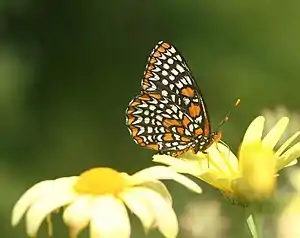| Baltimore checkerspot | |
|---|---|
 | |
| E. phaeton on Argyranthemum | |
| Scientific classification | |
| Domain: | Eukaryota |
| Kingdom: | Animalia |
| Phylum: | Arthropoda |
| Class: | Insecta |
| Order: | Lepidoptera |
| Family: | Nymphalidae |
| Genus: | Euphydryas |
| Species: | E. phaeton |
| Binomial name | |
| Euphydryas phaeton (Drury, 1773) | |
The Baltimore checkerspot (Euphydryas phaeton) is a North American butterfly of the family Nymphalidae. It has been the official state insect of the U.S. State of Maryland since 1973.[2] The Baltimore checkerspot was named for the first Lord Baltimore due to its similarity of colors in the family crest.[3] Despite the species status as Maryland state insect, the population in Maryland has faced significant decline and is currently listed by the Maryland Department of Natural Resources as "rare, threatened, and endangered" animal list.[4]
Life cycle
During its period of growth, the checkerspot butterfly will search for a host plant for nourishment. Its native larval host is the white turtle head (Chelone glabra), but it has also to some extent made use of the introduced lawn weed English plantain (Plantago lanceolata)[5] and other plants.[6]
Unlike most butterflies and moths, which overwinter as eggs, pupae, or sometimes adults, the Baltimore checkerspot overwinters as larvae. In late summer (sometime in July through September depending on latitude, weather, and other factors) the larvae spin a pre-hibernation web on a plant, stop feeding, and remain in the web. Several months later they leave this web and enter the litter (dead grass and leaves and so on) on the ground, where they spend the winter.[7]
 Caterpillar
Caterpillar
 Museum specimen
Museum specimen
References
- ↑ "NatureServe Explorer 2.0 - Euphydryas phaeton, Baltimore Checkerspot". explorer.natureserve.org. Retrieved 8 May 2020.
- ↑ "Maryland State Insect — Baltimore Checkerspot Butterfly". Maryland State Archives. 2004-06-17.
- ↑ "Rare, Threatened and Endangered Animal Fact Sheets". dnr.maryland.gov. Retrieved 2019-05-06.
- ↑ "Rare, Threatened and Endangered Animal Fact Sheets". dnr.maryland.gov. Retrieved 2019-05-06.
- ↑ M. Deane Bowers, Nancy E. Stamp and Sharon K. Collinge (Apr 1992), "Early Stage of Host Range Expansion by a Specialist Herbivore, Euphydryas Phaeton (Nymphalidae)", Ecology, 73 (2): 526–536, doi:10.2307/1940758
- ↑ Euphydryas phaeton (Drury, 1773) Archived 2010-09-06 at the Wayback Machine, Butterflies and Moths of North America
- ↑ M. Deane Bowers (1978), "Over-wintering behavior in Euphydryas phaeton (Nymphalidae)" (PDF), Journal of the Lepidopterists' Society, 32 (4): 282–288
External links
- Baltimore Checkerspot, photos and information on Jeff's Nature Pages
- Baltimore Checkerspot, Butterflies of Canada
